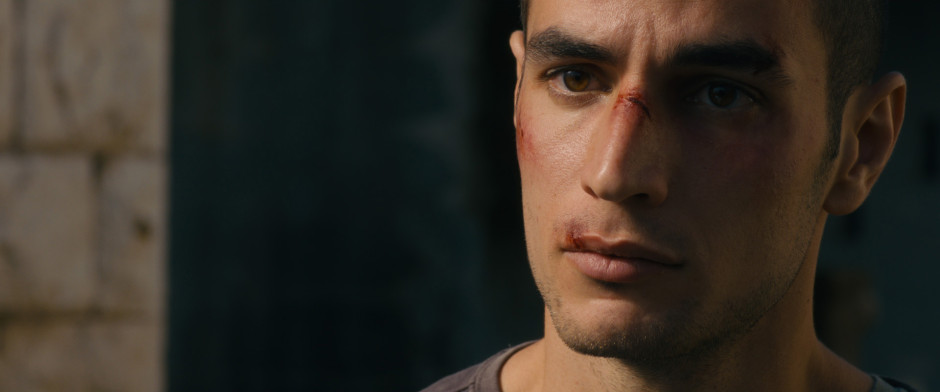Hany Abu-Assad’s taut thriller, Omar, gives a viewer a bird’s eye view of Israel’s occupation of the West Bank, now in its 47th year, and the Palestinians’ resistance to it.
An Academy Award nominee for best foreign picture, Omar unfolds in a Palestinian village that has been divided by a high, ugly concrete wall. Part of the separation barrier Israel built to keep suicide bombers at bay, the wall is an affront and a challenge to Omar (Adam Bakri), a young Palestinian pita baker.
On the one hand, the wall is an offensive symbol of an occupation he detests. On the other hand, the wall tests his resolve, courage and manhood.
In the first scene of the film, which opens in Canadian theatres on Feb. 28, Omar nimbly climbs the wall with the help of an attached rope. As he reaches the top, loud shots ring out, forcing him to descend quickly and run away before he is caught by the Israelis.
Omar scales the wall so he can visit friends on the other side of the village. Chief among them are Tarek (Eyad Hourani), the leader of a small armed group resisting the occupation; Tarek’s sister, Nadia (Leem Lubany), an attractive, dark-eyed student whom Omar is courting and wants to marry, and Amjad (Samer Bisharat), whose mumbling imitation of Marlon Brando never ceases to amuse Nadia.

As the scene shifts to a forest grove, Omar, Tarek and Amjad practise their shooting skills with a high-powered rifle. They are honing their skills for an impending special operation aimed at the Israeli army. Like most Palestinians in the West Bank who chafe at Israel’s intrusive presence, they believe that only a campaign of calculated violence will set them on the path toward Palestinian statehood and freedom.
Omar is a case study of the injustices inflicted on Palestinians by the occupation. Apart from dodging Israeli bullets at the summit of the wall, he is subjected to a humiliating experience by an Israeli patrol as he walks home. Having stopped Omar to frisk him for explosives, three soldiers arbitrarily force him to balance himself precariously on a rock as the sun beats down on him.
Abu-Assad shifts into higher gear in the next few scenes as Omar and his two friends shoot an Israeli soldier in an ambush and later flee for their lives as Israeli undercover agents aggressively pursue them through narrow alleys.
Despite remarkably agile attempts to elude his captors. Omar cannot escape. Strung up nakedly in a dank cell, Omar is successively interrogated and beaten by an Israeli agent, Rami (Waleed Zuaiter), who wants to know who killed the soldier. Facing a 90-year prison term, Omar agrees to cooperate with the Israelis. Rami releases him, giving him one month to convey the required information and turn over Tarek.
Omar, of course, is caught in an agonizing bind. A fervent nationalist, he does not want to be a collaborator, but neither does he wish to spend the rest of his life in jail. What to do? Tarek exerts further pressure on Omar by withholding approval of his proposed marriage to Nadia until he has taken part in another raid on the Israelis. The situation grows yet more complicated and complex when Omar learns, to his disgust and disappointment, that one of his friends is romantically involved with Nadia.
At its best, Omar, which was filmed in Israel and the West Bank, excels in creating an atmosphere of fear, paranoia and uncertainty. The Israelis are always on the hunt for Palestinian informers, a quest that unsettles and unnerves the Palestinians. Consequently, Omar comes under a cloud of suspicion, prompting Nadia to reassess her relationship with him.
Surprisingly enough, several of the actors in the all-Arab cast are amateurs. They, along with the professional performers, acquit themselves in stellar fashion.
In terms of plot and denouement, Omar is uncannily like Bethlehem, an Israeli film due to start its commercial run in Canada next month. Both movies showcase a tinderbox that is bound to explode sooner rather than later.
